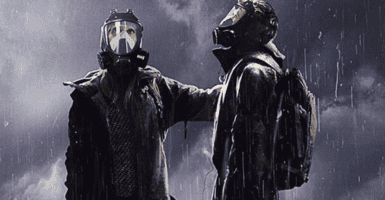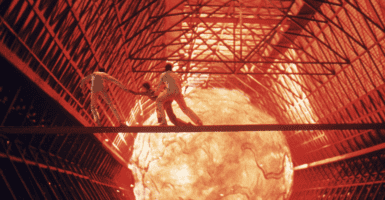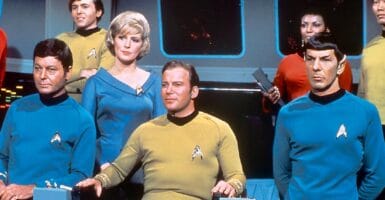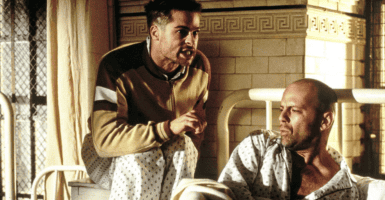The Best Time Travel Movies That Aren’t From Major Franchises
We're ruling out the easy ones and sifting through the best of the rest.
Ask your average moviegoer to name the best time travel movies ever made, and you’ll get a lot of the same names: the Back to the Future movies, the Terminator flicks, and one or more of the Star Trek films. And yeah, those are all excellent and worthy of praise, but they’re also too easy.
Because they are so well loved and so well done, they’re guaranteed to occupy the top tier of every single “Best Time Travel Movies” list ever written, including ours.
So to make things interesting, we tossed ’em right out. If it’s got “Back,” “Trek,” or “Terminator” in the title, it’s off the table.
Where does that leave us? We’ve picked out 10 noteworthy time travel flicks from the best of the rest. Not all of them were successes. Several of them were deeply flawed.
But they all have one thing in common: they found a way to bring something fresh to a creaky and over-explored genre. And given how many movies and TV shows and comics and novels have dipped their toes into a time vortex over the years, that’s a pretty damned impressive accomplishment.
The Final Countdown
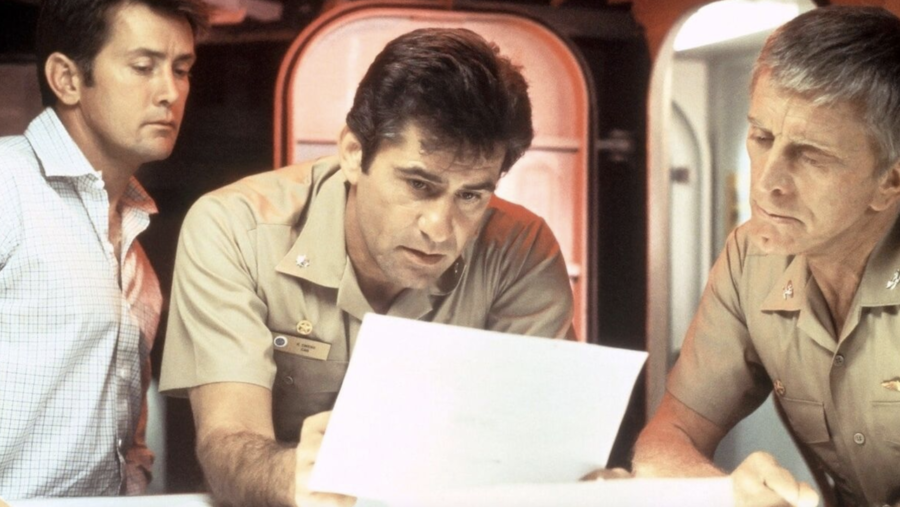
“What if you could travel back in time and kill Hitler?” It’s probably the biggest time travel question of all time, the definitive hypothetical that questions the morality and wisdom of trying to change something that has already happened.
The Final Countdown works from that same sort of idea, and even the same war. It asks, “What would happen if a modern aircraft carrier traveled back to the day before the attack on Pearl Harbor?”
The crew of the USS Nimitz slips through a time portal and finds themselves in just that situation. The obvious, visceral reaction is to want to use their more advanced weapons to defeat the sneak attack before it happens?
But what ripples would that send out? What if it delayed or prevented America’s entry into World War II? How would that change history?
Like most great time travel yarns, The Final Countdown is an exercise in choice and probability. The crew of the Nimitz are facing a long, dark hallway with a thousand different doors, and there’s no telling what could be behind any of them.
By showing the crew’s struggle with the predicament, The Final Countdown challenges the viewer to consider what they would do in the same fantastic situation, and hammers home the fact that even when the right thing to do seems obvious, that doesn’t mean it won’t lead to horrible consequences.
Even better, it wraps things up in a nicely circular fashion that any time travel aficionado should appreciate.
Somewhere In Time
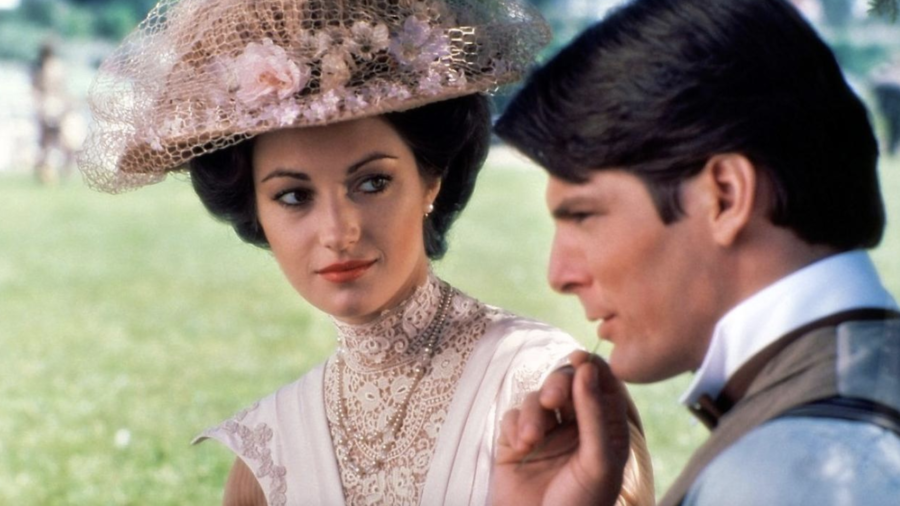
What if you were born in the wrong era? Based on the book Bid Time Return by Richard Matheson, Somewhere in Time stars Christopher Reeve as Richard Collier, a playwright who finds his life forever changed after a strange encounter with an old woman.
While he’s celebrating the success of his latest work, the unknown woman gives him a pocketwatch and asks him to “come back to me.”
What could just be an odd anecdote becomes something else years later when he sees a picture of Elise McKenna, a beautiful actress from the early 1900s. Enchanted by the woman, he tries to find out more about her and eventually realizes that she is the old woman who gave him the pocketwatch. He becomes convinced that they are destined to be together despite the span of years between them.
The method by which Richard eventually travels back to meet Elise is fantastic even by time-travel standards, but it fits in perfectly with the romantic, wistful feel of the movie.
Needless to say, a romance separated by decades and a death is probably doomed from the start, but when Somewhere in Time eventually brings an end to Collier’s foray into the past, he is ripped away from Elise thanks to the simplest and most mundane of mistakes.
It’s both poetic and tragic that the romance between Richard and Elise is spawned by her picture, an artifact from another time, and eventually destroyed by the most mundane of objects.
Flight Of The Navigator
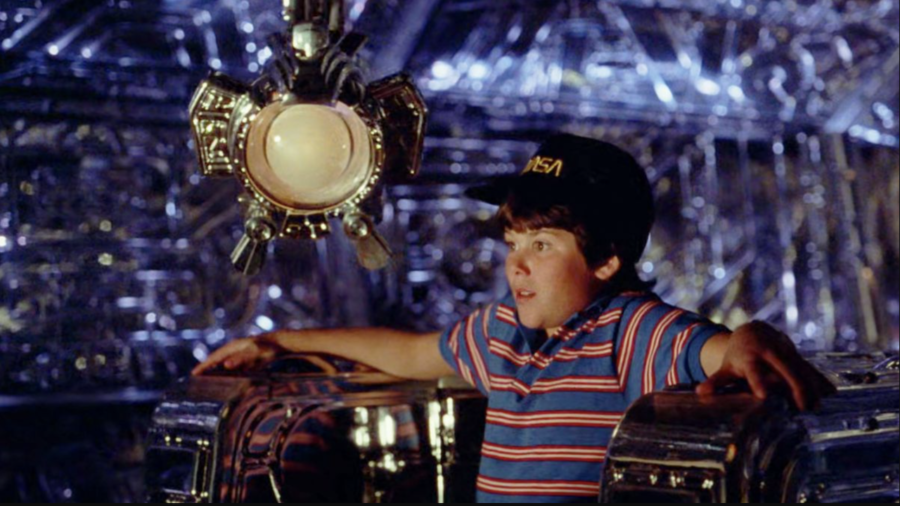
Let’s face facts: kids movies in the ’80s were awesome. For whatever reason, they hadn’t yet become the sterilized, often harmless products they’ve since become.
Kids in ’80s movies cussed, they were flawed, and they were never, ever safe. It’s the difference between the FBI agents menacing E.T. and Elliot with guns, as opposed to the ridiculous walkie-talkies Spielberg later replaced them with.
Case in point: Flight of the Navigator, which presents a kid’s daydream scenario — getting your own spaceship — and then shows all the horrible things that could happen because of it.
Twelve-year-old David Freeman gets to fly around the galaxy in an amazing UFO…but then he arrives back home with no memory of his travels, and with eight years having passed for his heartbroken family, despite him not having aged at all.
Government scientists want to poke and prod him, probing through his brain in hopes that they can learn to control the ship that he hitched a ride on, and which is now in their custody.
Even when David eventually decides he has to travel back to his home era of 1978, the ship’s A.I. warns him of how dangerous such a trip could be: David might be vaporized. After all, of all the things a time travel story can be, it should never, ever be safe.
12 Monkeys
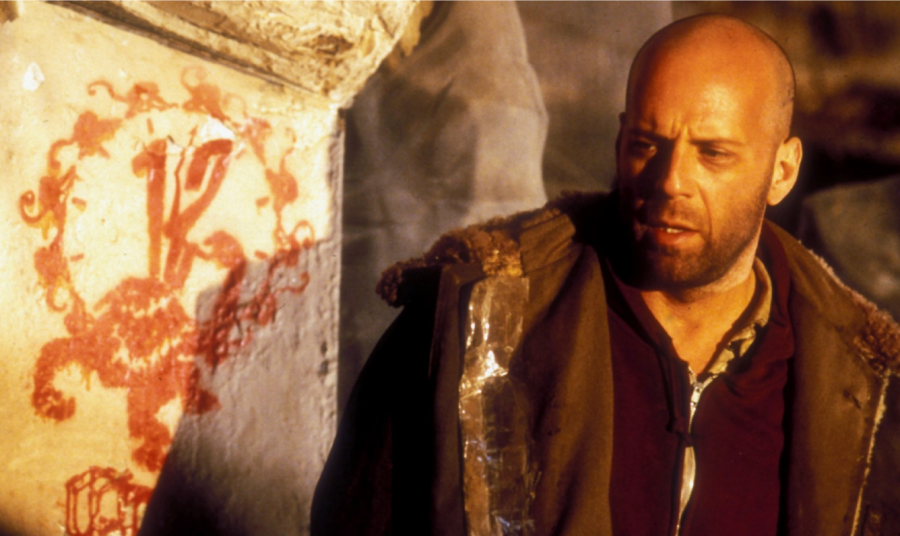
Time travel stories inevitably fall into two categories. The first ones assume that we can change our own past, even if only by creating a divergent alternate reality (see Back to the Future II or the first two Terminator flicks).
And there are the ones that presume that history is immutably fixed, that things will unfold more or less as they always did, regardless of how much we try to alter the flow.
It’s the idea of time protecting itself, of having a self-correcting defense mechanism that prevents rampant paradoxes.
12 Monkeys is easily one of the most elegant examples of that second category. Bruce Willis plays James Cole, a convict sent back in time from a diseased future and tasked with discovering who unleashed the world-ravaging virus.
For most of its length, 12 Monkeys teases the viewer into thinking maybe Cole really will change history. That makes it all the more shocking when it reaches its brilliant, poetic crescendo and all the divergent possibilities come crashing down beneath the weight of inevitability.
All we can do is watch it happen: what has to happen, what always happened.
Donnie Darko
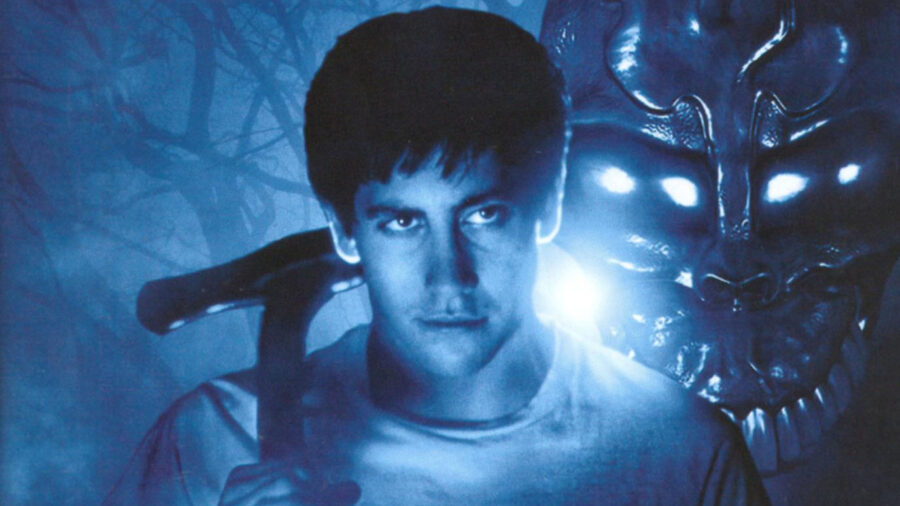
If you ever listened to any of writer/director Richard Kelly’s Donnie Darko commentaries, it quickly becomes apparent that his cult-classic film is a stupendous example of art by accident.
Donnie Darko raises many compelling questions, offers up many possible answers to those questions, and then wraps it all up in a coda that suggests that our best intentions are often not enough, and that every living being dies alone.
Then Kelly opens his mouth and reveals that he seems to know less about what’s going on his movie than the average casual viewer. (A case made all the clearer by the wholly unnecessary director’s cut.)
Still, whether thanks to sharp writing or sheer blind luck, Donnie Darko is a haunting story about the folly of finite beings trying to tinker around with things far more vast and complex than they can understand.
It is also a tragic story of one confused, tormented teenager who tries to make things better as best he can and who is nonetheless doomed from the start. If you find yourself asking, “What was the point?” as the credits roll…that was the point.
Primer
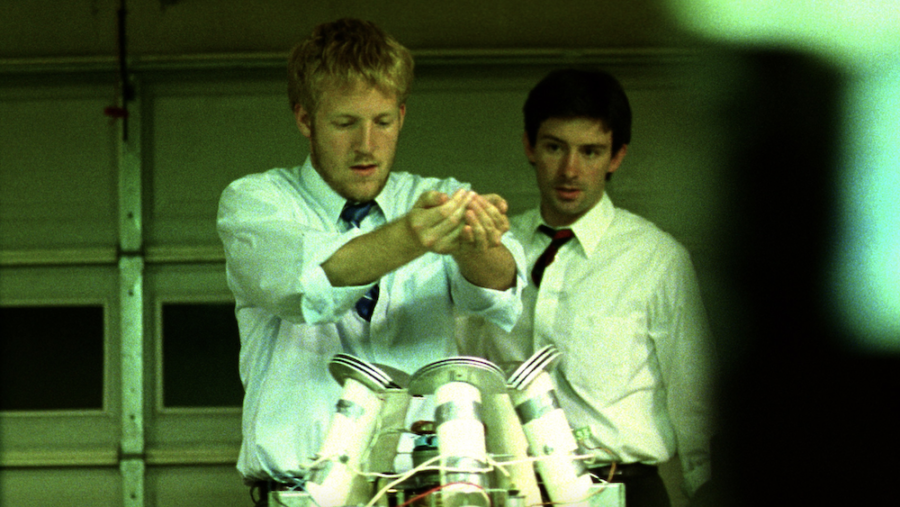
If time travel was possible, and if it was discovered, it’s easy to believe that this is how it would all play out.
That verisimilitude is there from the very start, as we’re shown very smart people trying to do very smart things and, in the process, backing into time travel without even intending to.
How many scientific discoveries over the years have arrived unexpected and unprecedented? Just as important as the machine’s unintentional discovery is how the characters react once they realize what they have. They want to test it, but they also realize how dangerous it could be.
They work out an elaborate system that minimizes the chance of paradox, and which, in the process, gives us a mind-bendingly complex timeline where the characters are crisscrossing their own timelines and duplicates over and over.
When I say that Primer demands at least two viewings before you can fully understand it, I mean that as a high compliment. Because Primer earns that investment of time with a narrative that, though challenging, ultimately ties together neatly.
You may resort to flow charts to help interpret it all, but that’s only because Primer is fascinating enough to leave you thinking about it for days, weeks, or years. (This might help as well.)
Deja Vu
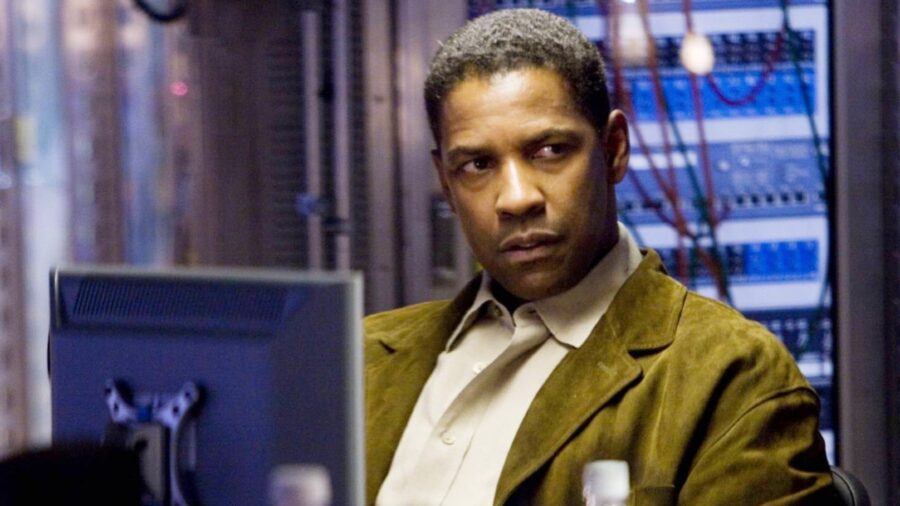
I expect to get a lot of grief for this one, and that’s understandable. With its RottenTomatoes ranking currently sitting at 55% fresh, Deja Vu is not generally considered a very good movie. Nor am I going to argue that it is.
What it does have, however, is some very clever ideas about how time travel could be used. The story follows an ATF agent, Doug Carlin (Denzel Washington), tasked with investigating a violent domestic terrorist attack in New Orleans.
Soon, Carlin is recruited by a secretive government task force that reveals something amazing: they have created a “time window” that allows them to see any events, but only as they occurred exactly four days, six hours, three minutes, 45 seconds, and 14.5 nanoseconds in the past. With this device, they hope to learn who planned the attack and prevent another one.
Things get even more complicated when Doug discovers that the time window can do more than simply show the past: inanimate objects can pass through it, potentially allowing them to alter the past.
Doug then begins pursuing the culprit in the present by tracking him through the past, eventually leading to a climax that, like many time travel stories, wraps back inward on itself and swallows its own tail.
Sadly, the produced movie isn’t nearly as good as the script by Terry Rossio and Bill Marsilii, but some of the ideas make it well worth at least one watch.
Source Code
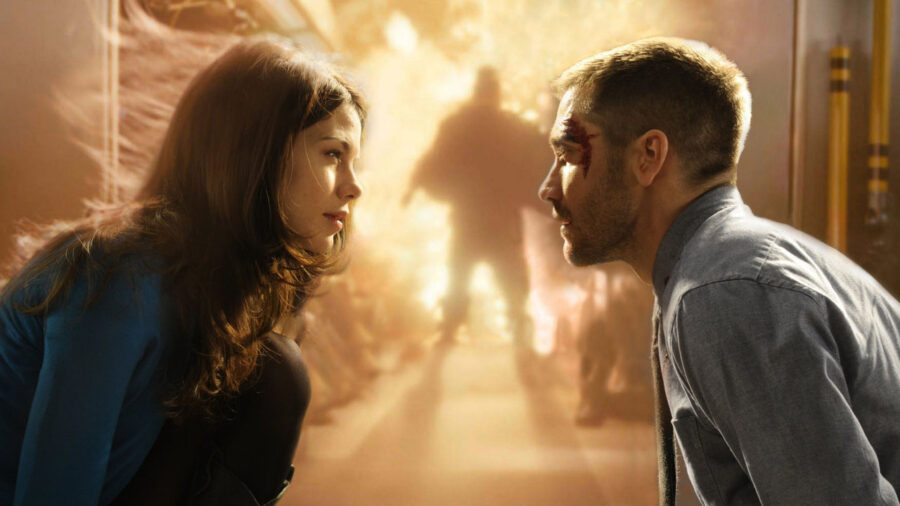
For much of its length, Source Code unfolds like a more serious thriller version of Groundhog Day, with Army helicopter Cole Stevens (Jake Gyllenhaal) awakening inside a mysterious cockpit.
He is told by an Air Force captain who speaks to him via videophone that he has been drafted for an experimental new tech that allows him to relive the last eight minutes of someone else’s life.
Within the stranger’s body, he can alter events within, creating an alternate timeline that he can interact with, but whose changes will not carry over to his “real” timeline. As with Deja Vu, the tech is being used to investigate a crime — the bombing of a Chicago commuter train — and to hopefully prevent another crime by the culprit.
As Cole tries repeatedly to determine the identity of the train bomber, he begins noticing inconsistencies that lead him to question the true nature of the Source Code tech, as well as what really happened after his helicopter crashed in Afghanistan.
Where Groundhog Day had its brilliant montage of Phil (Bill Murray) trying every possible means to kill himself and break the loop, Source Code has Cole trying not just to investigate the bombing, but actually to prevent it within the alternate timeline, and thus save the life of a girl he has met and fallen for on the train.
As Cole discovers the truth, Source Code opens up unexpected avenues, leaving us with a conclusion that is both perplexing and emotionally satisfying.
